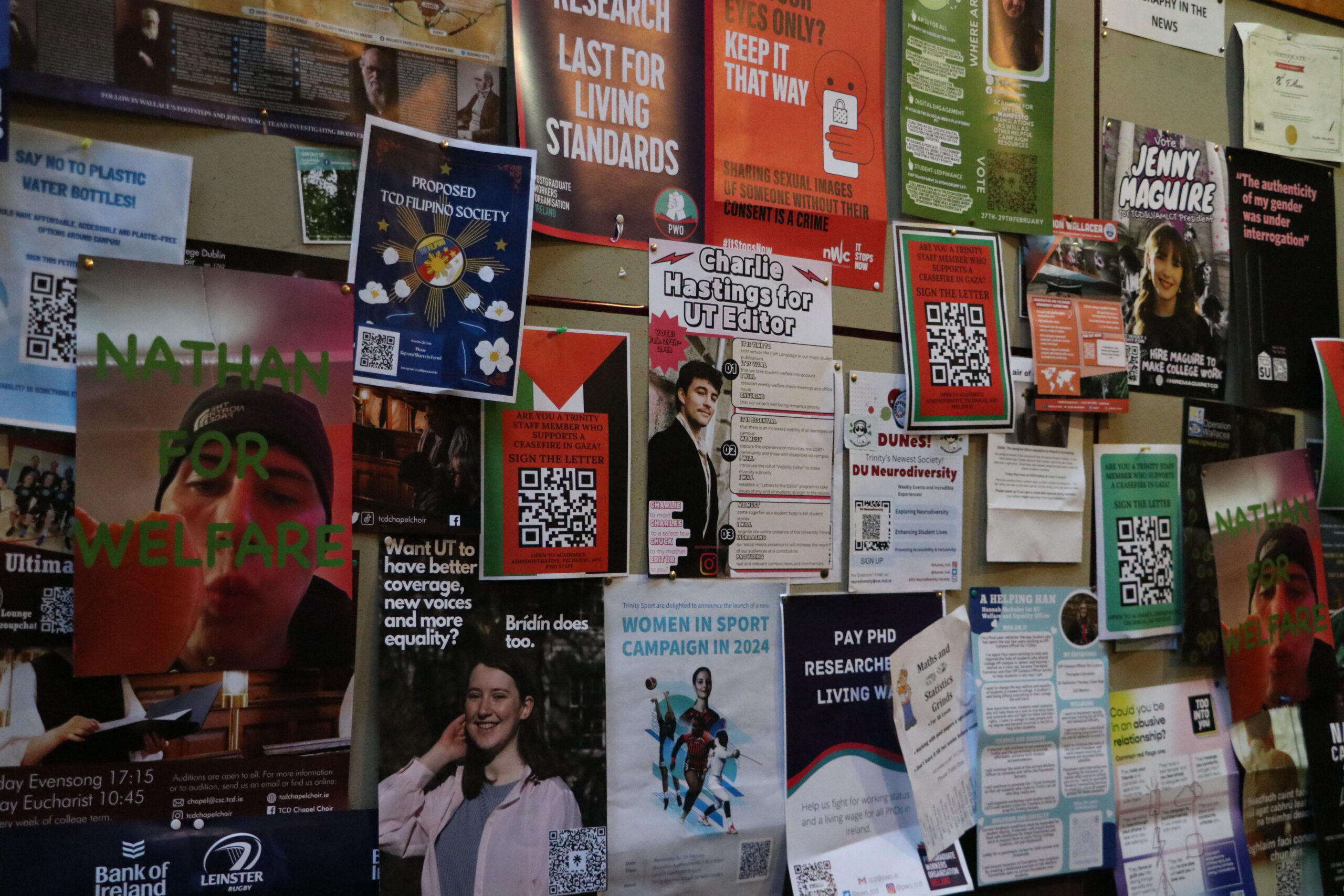Sabbatical elections are a huge deal, especially for Trinity College Dublin’s Students’ Union (SU), where it is of massive importance to elect several people to represent the various needs of our considerable student body and convey the needs of that population. In 2021, the University Times reported that 6,251 Trinity students registered to vote in the SU elections, which translates to roughly about 33% of the college’s entire student population. It is a season plagued with chaos, with people who have deemed themselves suitable “leaders” vying for your vote through relentless social media bombardment and proactive promotion at stands from their campaign teams, not to mention the mugshot posters, each with their own distinctive designs and fonts.
These tools, along with their manifestos detailing the problems in student life which they have identified and the changes pledged to fix them, are the election trade’s most reliable resources which – if well-crafted – may guarantee the desired position in the Student Union. For example, the current Entertainments officer, Olivia Orr, promised she would “keep the Trinity in Trinity Ball”, following an announcement that 2023’s event was the last to be held on Trinity campus until 2028. This was a main selling point in her manifesto, which led to her securing an unbeatable number of votes, and is something she has since delivered on.
Despite student politics and, in turn, sabbatical elections holding such prevalence in Trinity, I am simply unfazed by the passion, pledges and possibilities that may arise possible composition of our next Student Union. The rigmarole of election season never fails to instil a deep weariness in me whenever I set foot into college campus as mugshots and manifestos intrude on the poster space normally held by societies, event promoters and the odd band looking for a new member; these little ornaments are plastered over each and every one of Trinity’s little nooks and crannies. The taglines of candidates and their faces are inescapable. They somehow manage to wriggle inside my brain and forcefully etch themselves into my memory when I have absolutely no intention of voting. I am just trying to get to class and make sure I don’t fail college or drop out (again).
The election posters put up by hopeful candidates give the college a whole new layer of blandness that oozes across every building from Goldsmith Hall to the GMB. The boards occupied by societies and promoters advertising their next night out, giving the gloomy greyscale of Trinity a well-needed splash of colour, are disturbed by candidates so devoted to their causes they are willing to subject everyone who passes the gates of the institution to student politics, regardless of whether they hold an interest in these affairs or not.
Along with the aforementioned election posters, Instagram posts and introductory videos are carefully composed by each candidate to ensure that their reach will spread to those who are not even on the grounds of Trinity. This is orchestrated through the digitalisation of their campaigns and the unending regurgitation of posts by their team members or friends which plague feeds and make certain that no matter where you are, you will still be viewing the exact same circus that runs throughout the college. There is absolutely no chance to ignore, unsee or avoid this assault on your social media feed and it is highly inconsiderate of those who are in search of a break from the merchants trying so desperately to pawn their manifestos.
Finally, student politics in the college can generate immense negativity and lead to members of different communities in Trinity feeling disrespected and undermined. The most recent SU election season saw the introduction of a candidate whose eligibility to run was highly contested, who sparked controversy and fiery outrage through his use of offensive, incendiary language. This candidate notably referred to people with disabilities as “disableds” and appeared to undermine the case of abortion rights for women by referring to it as “the repeal the eighth thing”. Such harmful rhetoric has no place in society, nor within the walls of Trinity, where drastic efforts are being made to push inclusivity measures. It enrages me that student politics and the hubbub of elections can provide a public platform to such discriminatory speech, where each word is reverberated throughout the echo chambers of the campus.
I believe that the arduous process of student politics and its nonsensical exaggeration can pile immeasurable heaps of pressure onto the unfortunate shoulders of students caught up in the middle, just trying their best to cope with the rigorous demands of college. It is not something that should be promoted as heavily as it is, to the point where it feels like it is being shoved down people’s throats. Perhaps election posters could be displayed more sparsely to allow societies to showcase their plans and remind people that there are still events other than elections going on . The podium of publicity that voting season can also provide to those who wish to spout spiteful speech is sensational, allowing them to cause feelings of disrespect and degradation to certain communities in society and causing students who are part of those communities to feel helpless. These elements accumulate in election season to create a bubble of unwanted drama and controversy that surrounds the college and cause numerous students to be caught in the crossfire regardless of how much interest they may have. Therefore, I truly believe that the hullabaloo of sabbatical elections can truly cause more harm than good amongst the student population of Trinity College.






